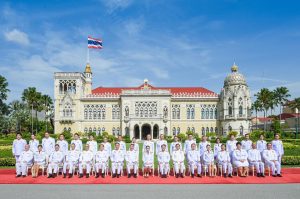On Friday, in a ceremony at Dusit Palace in Bangkok, Prime Minister Paetongtarn Shinawatra and 35 cabinet ministers were sworn into office, bringing to an end Thailand’s latest spell of political uncertainty – at least for now.
Paetongtarn, 38, was elected by parliament on August 16, after her predecessor Srettha Thavisin was unseated by the Constitutional Court, after appointing to his cabinet an official who had previously served a prison sentence. She now officially becomes the youngest prime minister in Thai history, and the third member of the Shinawatra clan to lead the country, after her father Thaksin and aunt Yingluck. (Thaksin’s brother-in-law also held the position for a brief period in 2008).
Dressed in their starched white official uniforms, Paetongtarn and her cabinet swore their allegiance in front of King Vajiralongkorn and Queen Suthida. “I want to wish, with gladness, that the cabinet will have the encouragement and determination to perform your duties as you have sworn for the benefit of the country and people,” the king told the assembled officials, according to a report by Reuters.
As I noted when its composition leaked to the media last week, Paetongtarn’s cabinet is expected to represent a mix of continuity and change. Pheu Thai will hold 17 ministerial posts, including the prime ministership and four of the six deputy prime minister posts. It will retain control of the foreign and defense ministries, although it has replaced Sutin Klungsang with Deputy Prime Minister Phumtham Wechayachai as minister of defense. It also holds those portfolios – commerce, finance, tourism, and transport – most crucial to the workings of the economy, which was a key priority of the outgoing Pheu Thai administration.
Of the remaining 19 cabinet positions, eight are held by Bhumjaithai party, Pheu Thai’s main coalition partner, including the interior ministry and education ministries and one deputy prime minister post. The conservative United Thai Nation Party will hold four positions, with two more going to the Democrat Party. The Democrats, long-time arch-rivals of Pheu Thai, were brought into the coalition to replace the military-backed Palang Pracharath Party (PPRP). However, a rump faction of the PPRP led by former Agricultural Minister Thammanat Prompao has been brought into the coalition, and has been rewarded with two positions, including agriculture minister, in the incoming cabinet.
Like its predecessor, the focus of the new administration will be on reviving the economy, which has grown at a sluggish pace since the COVID-19 pandemic. According to a policy statement released by the government on Saturday, and which Paetongtarn will present to Parliament later this week, Paetongtarn’s administration is set to continue with the country’s 450 billion baht ($13.1 billion) stimulus program, which will see eligible Thais receive one-time handouts of 10,000 baht ($292).
The statement says that the government will also take steps to boost agriculture and tourism, and to protect small and midsize enterprises from competition from overseas via e-commerce platforms. The flood of cheap products into Thailand, particularly from China, was flagged as a serious concern in a recent policy address by Thaksin Shinawatra, a major influence within the party. It will also take steps to address the country’s ballooning levels of household debt, which now totals an estimated 16 trillion baht ($474 billion).
According to the policy statement, Paetongtarn’s government has pledged to develop a “strategic petroleum reserve” in order to reduce energy costs for the Thai public and to negotiate with Cambodia to explore jointly new sources of natural gas in their overlapping claims area in the Gulf of Thailand. It also hopes to expand the country’s tax base, including by introducing a negative income tax for low income earners.
The policy document states that the government will promote medical cannabis in order to add value to the economy. This goal, which led Bhumjaithai and its leader Anutin Charnvirakul to spearhead the historic decriminalization of cannabis under a previous government in 2022, suggests a reversal on the Srettha administration’s pledge to relist the drug as a narcotic due to the social impacts of its de facto legalization.
The policy statement also confirmed that the government will move ahead with legalizing gambling and promote large-scale infrastructure and connectivity projects. Chief among the latter is the $30 billion Landbridge project, which envisions the construction of an overland transport corridor across the Isthmus of Kra in Thailand’s south, which would create a link between the Indian with the Pacific oceans.
All of these goals hinge on Paetongtarn surviving long enough to implement them, something that can hardly be taken for granted given the fortunes of past Pheu Thai governments, not least that of her predecessor, who was removed from office just shy of a year after taking his oath of office. A number of legal complaints have already been filed against Paetongtarn and her party, one of which alleges that the party has improperly permitted Thaksin to control the party, despite not holding a formal leadership position within it. Another calls for the new Thai leader to be investigated for corruption.
During a special cabinet meeting on Saturday, the new Thai leader pledged to complete her three-year term in office and announced that should would establish a special team to handle any legal complaints brought against her. But the fact that Paetongtarn feels such a need suggests a certain inevitability to the fact that Thailand’s new government will be besieged by court proceedings of one kind or another, raising doubts about its ability to implement its agenda effectively.

































